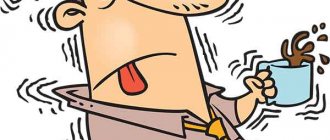As the World Health Organization points out, depression is one of the leading causes of morbidity and disability among adolescents and adults [WHO, 2020]. Back in 2021, more than 120 million people worldwide suffered from depression. According to official data, depression is diagnosed in only 40% of patients who actually suffer from it. It is also reported that we have entered an age of melancholy [G. Lyubin, 2019]. We are convinced that after 2021, when we had to endure an epidemic, quarantine, transition to distance learning and work, the situation with this unpleasant disease has not improved...
Unfortunately, the word “depression” can be heard or seen almost everywhere today, sometimes even in places where it is completely inapplicable, and from people who actually do not understand what it is and do not take it seriously. You need to understand that any melancholic mood, decline in emotional tone, apathy or lethargy cannot be recognized as depression, these are only its symptoms. The disease itself is much more complex, extensive and complex. Let's figure out together what it is and whether depression can be measured somehow.
Description of the technique
Beck Depression Inventory
(Beck Depression Inventory) proposed by A.T. Beck in 1961 and developed on the basis of clinical observations, which made it possible to identify a limited set of the most relevant and significant symptoms of depression and the most frequently reported complaints by patients. After correlating this list of parameters with clinical descriptions of depression contained in the relevant literature, a questionnaire was developed that included 21 categories of symptoms and complaints. Each category consists of 4-5 statements corresponding to specific manifestations/symptoms of depression. These statements are ranked according to the increasing specific contribution of the symptom to the overall severity of depression.
In accordance with the severity of the symptom, each item is assigned values from 0 (the symptom is absent or minimally expressed) to 3 (the maximum severity of the symptom). Some categories include alternative statements of equivalent weight.
In the original version, the method was completed with the participation of a qualified expert (psychiatrist, clinical psychologist or sociologist), who read each item from the category out loud, and then asked the patient to choose the statement that most corresponds to his current condition. The patient was given a copy of the questionnaire, according to which he could follow the items read by the expert. Based on the patient's response, the researcher marked the appropriate item on the form. In addition to the test results, the researcher took into account anamnestic data, indicators of intellectual development and other parameters of interest.
Currently, it is believed that the testing procedure can be simplified: the questionnaire is given to the patient and filled out independently.
The score for each category is calculated as follows: each item on the scale is scored from 0 to 3 according to the increasing severity of the symptom. The total score ranges from O to 62 and decreases in accordance with the improvement of the condition.
Depression: briefly about the concept
The classic definition of depression includes three components:
- Anhedonia is a decrease in the ability to receive pleasure from factors that once brought it.
- Cognitive impairments specific to depression: decreased rate of thinking, presence of pessimistic judgments in thinking, etc.
- Decreased motor activity: movements become reluctant, slow, heavy.
Biochemically, depression is usually defined by a lack of mainly two hormones - serotonin and norepinephrine. That is why most drugs containing these neurotransmitters, so-called antidepressants, are designed to help fight depression.
Depression usually comes in two forms:
- astheno-depressive syndrome (apathetic or melancholy depression);
- anxiety-depressive syndrome (anxious depression).
In terms of content, these two forms differ in the emotional state in which a person is: in the first form, apathy, deterioration in motor and cognitive activity, and a melancholic mood are observed; with the second, a person is overcome by anxiety, phobias, anger, etc. Depending on the specific form, psychotherapists select the necessary course of treatment [G. Lyubin, 2019].
There are two main ways to combat depression: taking antidepressants and psychotherapy sessions. In this case, a person must be determined to heal, he must necessarily have a desire. If this is not the case, then friends and relatives should be active, try to help the patient, try to cheer him up and push him on the path of competent treatment.
If you want to know a little more about what depression will bring in the future, we recommend watching the following video from the PostScience project:
If you feel that some of the symptoms of depression are becoming your life companions, then we advise you to take action in time. One of these methods is our online program “Mental Self-Regulation”, where in 6 weeks you can overcome stress, get rid of anxiety and fear, apathy, procrastination and other unwanted symptoms that can lead to depression.
And we smoothly move on to the method of assessing the disease in question, and we will begin with the introduction of a major scientist of our time, whose name is directly related to the depression scale.
Procedure
Instructions
“This questionnaire contains groups of statements. Read each group of statements carefully. Then identify one statement in each group that best matches how you felt THIS WEEK AND TODAY. Check the box next to the statement you selected. If several statements from one group seem equally good to you, then check the box next to each of them. Make sure you read all statements in each group before making your choice."
Gradation of states on a scale
Let's take a closer look at each gradation.
- Normal state (no depression)
Surely you, like many other people, are subject to mood swings. Something unpleasant might have happened to you, something that upset you or pissed you off. But this is a one-time condition; it will not last for the next few days. And most likely it will change when you calm down or the situation changes.
- Mild to moderate depression
If the survey shows this result for you, don’t worry. Depression in this form is not a disease. Most likely, this is subdepression, which can occur if you are tired or are currently experiencing difficult circumstances. This condition can occur from an improperly structured daily routine or a sedentary lifestyle. In this case, you need to think about helping the body work in a healthy manner.
- Severe depression.
At this stage, you most likely no longer want to see your friends; any other communication bothers you. You may feel disappointed in yourself and tired of yourself. This can happen as a result of injury or long-term illness. You may be faced with the thought: “You can’t change anything. Dead end". In this condition, it is important to consult a specialist.
- Severe form of depression.
In this state, you can be prone to aggression. See the “bad” in everything. Problems with nutrition may begin and weight may drop significantly. In this case, urgent help from specialists is needed.
Processing and interpretation of results
When interpreting the data, the total score for all categories is taken into account.
Adult version of the questionnaire
Total score
- 0-9 – absence of depressive symptoms
- 10-15 – mild depression (subdepression)
- 16-19 – moderate depression
- 20-29 – severe depression (moderate)
- 30-63 – severe depression
Subscales
- Items 1-13 – cognitive-affective subscale (CA)
- Items 14-21 – subscale of somatic manifestations of depression (SP)
Individual symptoms
It is also possible to separately assess the severity of 21 symptoms of depression:
- Mood
- Pessimism
- Feeling of inadequacy
- Dissatisfaction
- Guilt
- I feel like I'll be punished
- Self-loathing
- Self-blame ideas
- Suicidal thoughts
- Tearfulness
- Irritability
- Disruption of social connections
- Indecisiveness
- Body image
- Loss of performance
- Sleep disturbance
- Fatigue
- Loss of appetite
- Weight loss
- Involvement in bodily sensations
- Loss of libido
Teen version of the questionnaire
- Up to 9 points, satisfactory emotional state - 4 points,
- From 10 to 19 points, mild depression - 3 points
- From 19 to 22 points moderate depression - 2 points
- More than 23 points severe depression - 1 point
A depression level of 19 is considered clinically impaired; a level above 24 points indicates the need for therapy, possibly with the use of antidepressants. The goal of treatment should be to achieve a depression level below 10 points.
How to pass the Beck test
Read carefully the 21 groups of statements Beck Depression Inventory-II (BDI-II) / The Psychological Corporation. In each, mark the item that most fully reflects your condition in the last two weeks, including today. If in any of the groups it is difficult for you to decide between two or three options, choose the one with more points.
The Beck Depression Inventory-II (BDI-II)/Psych Congress Network test typically takes no more than 10 minutes to complete.
Sadness
- 0 — I don’t feel upset or sad.
- 1 - I feel sad from time to time.
- 2 - I feel upset all the time.
- 3 - I am so upset and unhappy that it seems unbearable.
Attitude to the future
- 0 - The future doesn't seem scary to me.
- 1 - I began to worry about the future more often than before.
- 2 - I don't expect anything good.
- 3 - My future seems hopeless. Things are only getting worse.
Past failures
- 0 — I can hardly be called a failure.
- 1 - Failures and setbacks happen to me more often than to other people.
- 2 — There have been many failures and disappointments in my life.
- 3 - I'm a complete loser.
Enjoyment of life
- 0 — I am quite satisfied with life.
- 1 - I used to enjoy things more.
- 2 - I stopped enjoying even those things that made me happy before.
- 3 - My life is terrible, and there is no silver lining.
Guilt
- 0 — I don’t feel any particular guilt towards anyone or anything.
- 1 — Quite often I feel guilty for things I could have done but didn’t.
- 2 - I feel guilty very often.
- 3 - I constantly feel that I am guilty before everyone.
Waiting for punishment
- 0 — I didn’t do anything for which I should be punished.
- 1 - I have something to be punished for.
- 2 - I constantly live in anticipation of punishment.
- 3 - I have already been punished for everything I have done.
Attitude towards yourself
- 0 — I treat myself as usual.
- 1 - I think I've lost my confidence.
- 2 - I'm disappointed in myself.
- 3 - I just hate myself.
Self-criticism
- 0 - I know that in general I am no worse than others.
- 1 - I see more flaws in myself than before.
- 2 - I know all my shortcomings and mercilessly criticize myself for them.
- 3 - I am one complete flaw. Only I am to blame for everything bad that happens around me.
Suicidal thoughts
- 0 — I have never thought of committing suicide, this is not my solution to problems.
- 1 - Sometimes I have thoughts of suicide, but they are random, I don’t plan to carry it out.
- 2 — I regularly think that suicide would be a good solution.
- 3 - I will be relieved to be done with it all. I'm just waiting for the opportunity to present itself.
The urge to cry
- 0 — If I cry sometimes, it’s obviously no more than before.
- 1 — Now I cry more often than before.
- 2 - I cry almost constantly.
- 3 - I want to cry, but I can’t anymore.
Anxiety, nervousness
- 0 — I’m calm, everything is as always.
- 1 - I feel more restless than usual.
- 2 - I constantly feel nervous, I twitch over trifles.
- 3 - I'm so nervous that I have to move or do something all the time, otherwise I'll just go crazy.
Loss of interests
- 0 — I am still interested in other people, I have hobbies.
- 1 - I began to be less interested in what was happening around me.
- 2 - I’m bored with other people, they’re annoying.
- 3 - I lost interest in everything.
Decision making ability
- 0 - I make decisions the same way as before.
- 1 - It has become more difficult for me to decide something, I doubt more often and would like someone to take responsibility.
- 2 — Every decision is difficult for me.
- 3 - I don’t want and can’t decide anything.
Own need
- 0 — I am still needed by both others and myself.
- 1 - Something has broken in me and more and more often it seems that no one needs me.
- 2 - I feel worthless compared to others.
- 3 - I am absolutely useless.
Internal Energy Estimation
- 0 — I am energetic as always.
- 1 — Lately I have less energy than before.
- 2 - I don't have enough strength to do what I should.
- 3 - I have no strength for anything.
Sleeping mode
- 0 — I sleep as usual.
- 1 - I started sleeping more or less than before.
- 2 - I sleep a lot more (less) than usual.
- 3 - I am ready to sleep most of the day. Or on the contrary: I often wake up in the middle of the night and then cannot fall asleep for a long time.
Irritability
- 0 - I am no more irritable than usual.
- 1 - I started to get irritated more easily than before.
- 2 — I regularly find myself getting annoyed by everything.
- 3 - I constantly feel irritated, even when there seems to be no reason.
Appetite
- 0 — I eat the same amount as always.
- 1 - My appetite has changed a little: I find myself eating more or less than before.
- 2 - My appetite has decreased (increased) much less than it was before.
- 3 - I have no appetite at all. Or on the contrary: I am constantly hungry.
Concentration of attention
- 0 — It’s easy for me to concentrate on a particular task.
- 1 — Lately there have been some problems with concentration.
- 2 - I find it difficult to concentrate on anything for more than a few minutes.
- 3 - I found that I couldn't concentrate at all.
Fatigue
- 0 — I’m just as tired as always, nothing has changed.
- 1 - I started to get tired faster than usual.
- 2 - I’m still coping, but more and more often I find myself giving up some of my usual activities (sports, meeting friends, traveling) because I simply don’t have the strength to do them.
- 3 - It seems that I even wake up already tired.
Interest in sex
- 0 — My libido has not changed recently, everything is as usual.
- 1 — Sex interests me a little less than before.
- 2 - I think about sex extremely rarely, it has faded into the tenth plane.
- 3 - I completely lost interest in sex.











